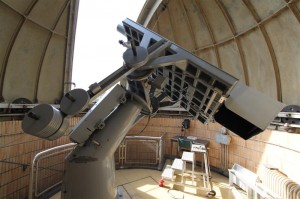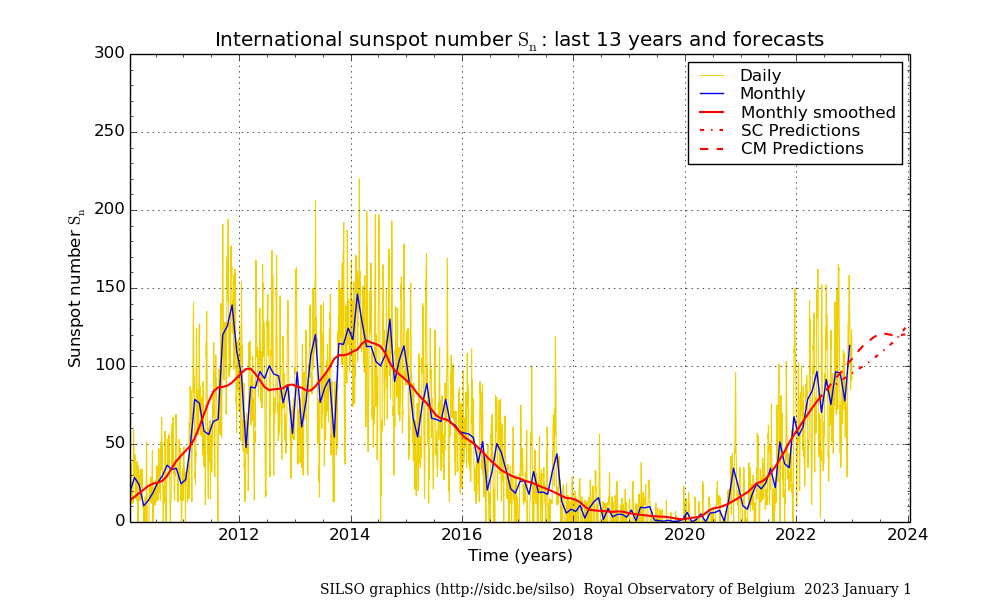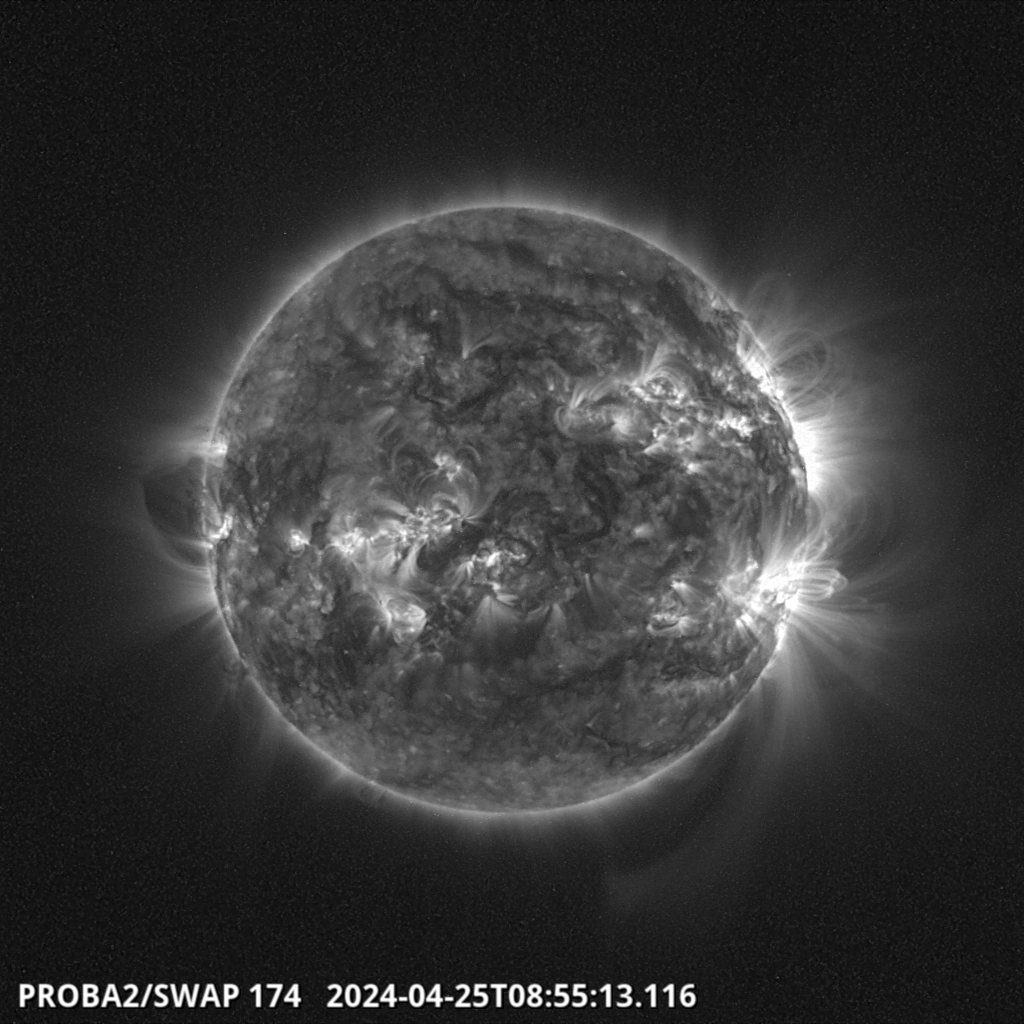Solar Physics and Space Weather
The Operational Directorate “Solar Physics and Space Weather” is known internationally as the Solar Influences Data analysis Center, SIDC.
Missions and objectives
The mission of the “OD Solar Physics and Space Weather” is to advance knowledge on the Sun and its influence on the solar system, through research and observations. We provide this knowledge and expertise to the scientific community, to the society, the government and the industry through operational services and dissemination at both the national and the international level.
The goal of our research activities is to increase our understanding of the Sun and its influence on the solar system. The specific topics that we aim to research are inspired by our own operational activities, by our heritage in some sub disciplines and -last but not least- by a passion for understanding the Sun and its effects at a more fundamental level.
The goal of our observational activities is, through deep involvement in relevant instruments in space and on the ground, to have a full understanding of the complete data acquisition and calibration process. Our observational activities span the full range from instrumentation technology to data collection and analysis. A close internal collaboration ensures that our research and/or operations benefit directly and intensely from these observational activities. Our ambitions include developing advanced technologies, operating our own facilities and establishing stable infrastructures supporting long-term solar monitoring and standards.
The goal of our operational services is to have an active, leading role in European space weather services and to provide state-of-the-art data services. We want to continuously improve and monitor the accuracy/quality of our space weather predictions and solar indices, primarily the international sunspot index. We want to provide high level space weather reports and solar activity predictions to industry and to the wider community. The goal of our data services is to produce, archive and distribute our own data and indices through state-of-the-art processing pipelines, data bases and interfaces.
The goal of our dissemination activities is to be the primary national reference and source of information on the Sun, solar activity and space weather for all Belgian user communities (general public, schools, industry, authorities and funding agency). At the international level, we want to contribute to dissemination programs.
Activities
Our activities can be grouped in the following themes, each with their specific objective:

Ground-based imaging telescopes
The Uccle solar equatorial table (USET) is our optical solar monitoring facility, imaging the Sun in visible light. The objectives of USET are the production, archival, distribution and exploitation of global information about structures and events in the photosphere and chromosphere, as part of the continuous world-wide ground-based monitoring of solar activity.
The Humain Radioastronomy Station
We build, maintain and operate a solar radio-astronomy station in Humain (south of Belgium). The objective of the Humain Radioastronomy Station is to monitor the solar activity in the metric and microwave range, giving near real time information on eruptive events
Solar activity monitoring on the longest time-scales
The international sunspot number , that we produce here at the World Data Center SILSO, is among the longest running time-series of solar activity. In this context, it is our objective to preserve, develop and diffuse the knowledge of the long-term variations of solar activity, as a reference input to studies of the solar cycle mechanism and of the solar forcing on the Earth’s climate.
Operational space weather services
We provide operational space weather services through the “Regional Warning Center Belgium” (ISES) and our ESA/SSA activities. The objective is to provide high quality and timely information on space weather, both review reports, alerts and forecasts.
Solar image processing
We have pioneered the application of advanced image processing techniques on solar images ( CACTus, SPoCA, soFAST, …).
The objective is to automate the production of metadata, event-catalogues and higher-level data products such that large data volumes can be efficiently and timely handled.
Technological (hardware) preparation for future instruments
We have built key expertise in hardware technology such as wide band gap photodetectors and CMOS active pixel sensors. The objective is to develop advanced technology in support to the next generation of solar scientific instruments. In support to this objective, DeMeLab is a STCE/ROB facility that we use to perform high-quality characterisation and calibration of instrument components (e.g. detectors, LEDs, filters) and to calibrate flight models of future space-based instruments.
Space based instruments and their operations
We operate a science operation center for the PROBA2 mission and we are preparing a similar facility for the EUI instrument onboard Solar Orbiter. The objective of this activity is to have critical influence on the detailed operations of space instruments, from the time they are designed, up till the time when they acquire essential data sets.
Visualization and distribution of solar data
Various of our activities have addressed their need to distribute and visualize solar data (SWB, SDO data center, STAFF). Our objective on the long run is to even better address this need by setting up common services (FITS I/O service, a metadata service, an ephemeris service, a logging service, a workflow service, a data storage service) on which the other activities can depend.
Fundamental research
A significant part of our research is embedded in, and applied to, the above observational and operational activities. Such applied research is only viable if it is in perpetual discussion with research at a more fundamental level, where our objective is to advance knowledge on the Sun and its influence on the solar system without constraints.
Dissemination
Just like research, a large fraction of our dissemination activities is embedded in the different activity themes discussed above. Some dissemination activities however are wider in scope and effort: provision of a coherent website that overviews all our activities and provides general information, the organization of big international conferences. The objective of our internal dissemination (seminars, student training, etc) is to share the pleasure of insight, build team spirit and reinforce mutual collaborations.




